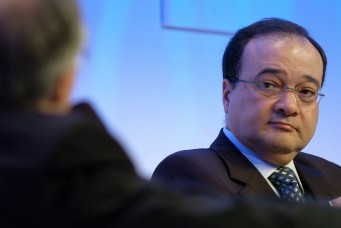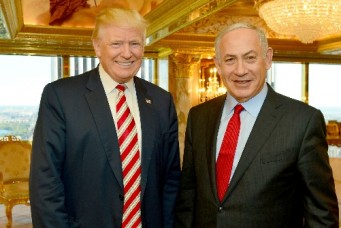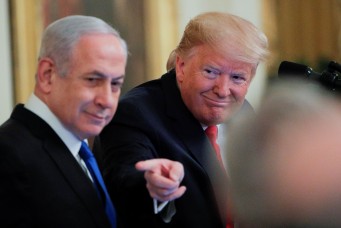Hanan Ashrawi: “We Are Seriously Worried”
The Trump administration has suggested dropping the two-state solution and moving its embassy to Jerusalem. Influential Palestinian leader Hanan Ashrawi speaks out.

Palestinian legislator and activist Hanan Ashrawi, Kuwait City, Feb. 11, 2013. Stephanie Mcgehee/Reuters
Longtime member of the Palestinian Legislative Council Hanan Ashrawi says that President Donald Trump’s early foreign policy signals are making Palestinians deeply apprehensive about the prospects for an Israeli-Palestinian peace agreement. Cairo Review Reporter-Researcher Katherine Pollock interviewed Ashrawi by phone on February 8, 2017.
CAIRO REVIEW: How will Trump’s policies affect peace negotiations?
HANAN ASHRAWI: The problem is not negotiations. We’ve been negotiating since 1991. The problem is the commitment and the political will to respect international law and to have genuine negotiations that would really lead to ending the occupation and a peaceful solution. And [Israeli Prime Minister Benjamin] Netanyahu would like nothing better than an endless process of negotiations in order to buy more time to create more facts to destroy the two-state solution. So what we need would be a positive engagement and an involvement that would, on the one hand, curb Israeli violations, lead Israel to compliance with international law and create a system of accountability for Israel, but, at the same time, create a system of protections for the Palestinians and ensure that whatever negotiations that will emerge will be based on international law and will have clear objectives and a clear timeline.
CAIRO REVIEW: How do you see the power dynamic between Trump and Netanyahu?
HANAN ASHRAWI: The election rhetoric from Trump was extremely alarming: refusing to acknowledge the two-state solution or even recognize the existence of the occupation, and all sorts of irresponsible promises, like moving the American embassy to Jerusalem, and not condemning settlements at all. Trump is signaling, definitely, a change in American policy. We are seriously worried because populism, extremism, the language of ideology, racism, all these things that are emerging in the United States have been in power since Netanyahu took office in Israel. The whole discourse in Israel— political and social and moral—has shifted to the extreme right, and so it resonates with the American administration, particularly given that there are people who are settlers and who support settlements in the White House now: Jared Kushner, whose family has a foundation to support settlements; [Trump nominee to become U.S. ambassador to Israel David] Friedman, who supports the Beit El settlement. There is a core group within the administration, even in the White House, that is supporting the whole settler movement in Israel, and, as far as we are concerned, this is a crime.
CAIRO REVIEW: On settlements, some see Trump flip-flopping on the issue.
HANAN ASHRAWI: It’s very hard to read Trump beyond him saying that he says what he means and he implements what he promises. In terms of the settlements, there is a real change. Settlements are illegal, according to international law, and longstanding American policy. They are not just an obstacle to peace, they are illegal, and they are a war crime, and they should stop. Right now, the language that is emerging is that existing settlements are not an obstacle to peace and that if you build new settlements or expand beyond the borders of the settlement, they may become an impediment. This language is not acceptable. We need clarity, we need commitment internationally, and we need recognition of the components of peace, and the requirements. These are imperatives. You cannot get around them, because they will impact not just the chances of peace, not just the stability and security of Palestine, but the region as a whole and even beyond. This type of extremist language resonates with extremists in the region.
CAIRO REVIEW: How do you expect Trump to react to the proposed Israeli law to retroactively legalize thousands of West Bank settlements?
HANAN ASHRAWI: This is really such an alarming escalation, because Israel is legislating in a way that violates international law, in a way that, really, is like legalizing crimes. They [the international community] have to tell Israel that there are limits to its impunity and its deliberate violations of international law. This is a very dangerous law, and Israel has no right and no business legislating such laws, and this will complete the annexation of the West Bank altogether. Netanyahu is busy superimposing Greater Israel on all of historical Palestine.
CAIRO REVIEW: Will the Palestinian leadership move more towards the United Nations and the European Union?
HANAN ASHRAWI: For some time now we have been moving towards multilateralism, rather than Israeli unilateralism or what is called a bilateral negotiation process. Because obviously, the bilateral negotiations accommodate the power asymmetry—number one and two—with the United States dominating; it weighs in, in favor of Israel.
CAIRO REVIEW: You argue that Trump’s talk about moving the American embassy to Jerusalem will actually undermine U.S. interests?
HANAN ASHRAWI: Yes. Because it will be seen as being complicit with Israel, and recognizing Israel’s illegal annexation of Jerusalem. And it will be a direct affront to the feelings and the spiritual beliefs, as well as to send a gesture to Palestinians, Arabs, Muslims, people of cultures everywhere, Christians, by turning this also into a religious war. Such moves will not only disqualify the United States as a so-called peace broker, but will also place it in confrontation with the Arab and Muslim public as a whole.
CAIRO REVIEW: At the end of the Obama administration, Secretary of State John Kerry gave a speech that many saw as favorable to the Palestinian cause. How did you see that?
HANAN ASHRAWI: It’s too little too late. They waited seven and a half years after the famous Cairo speech of Obama. Instead of moving quickly, he immediately succumbed to Israeli pressure and blackmail. They put him on the defensive by constantly accusing him of not being pro-Israeli enough, which meant that he spent the seven and a half years trying to prove that he’s Zionist enough, that he’s good for Israel to the point where he gave Israel more technology, more know-how, more funding, more support, more capital. He gave the Israeli government more than any other American president.





